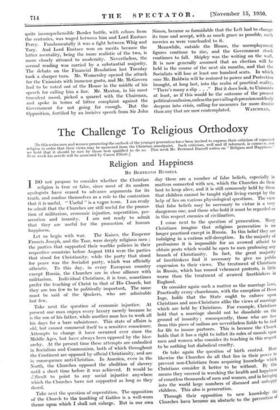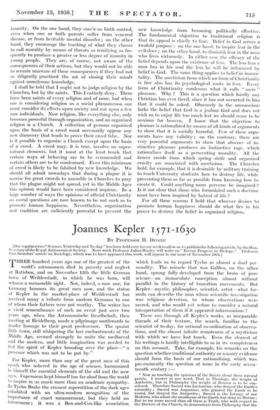The Challenge To Religious Orthodoxy
[In this series men and women presenting the outlook of the younger generation have been invited to express their criticism of orcoMmil religion in order that their views may be answered from the Christian standpoint. Such criticism, well and ill informed, is commcn, and we hold that it should be met by those best qualified to do so. This week Mr. Bertrand Russell writes on " Religion and Happiness." Next week his article will be answered by Canon Elliott.]
Religion and Happiness
BY BERTRAND RUSSELL
IDO not propose to consider whether the Christian -I- religion is true or false, since most of its modern apologists have ceased to advance arguments for its truth, and confine themselves as a rule to the contention that it is useful. " Useful " is a vague term. I am ready to admit that the Churches are still useful for the promo- tion of militarism, economic injustice, superstition, per- secution and insanity. I am not ready to admit that they are useful for the promotion of human happiness.
Let us begin with war. The Kaiser, the Emperor Francis Joseph, and the Tsar, were deeply religious men ; the parties that supported their warlike policies in their respective countries before August 1914 were the parties that stood for Christianity, while the party that stood for peace was the Socialist party, which was officially atheistic. To this day, in every European country except Russia, the Churches are in close alliance with militarism. Individual Christians, it is true, sometimes prefer the teaching of Christ to that of His Church, but they are too few to be politically important. The same must be said of the Quakers, who are admirable but few.
Take next the question of economic injustice. At present one man enjoys every luxury merely because he is the son of his father, while another man has to work all Isis days for a bare subsistence. This state of affairs is old, but cannot commend itself to a sensitive conscience. Attempts to change it have occurred ever since the Middle Ages, but have always been opposed by the hier- archy. At the present time these attempts are embodied in Socialism and Communism, both of which throughout the Continent are opposed by official Christianity, and are in consequence anti-Christian. In America, even in the North, the Churches opposed the abolition of slavery until a short time before it was achieved. It would be ZIfficult to point to any social injustice anywhere which the Churches have not supported as long as they dared.
Take next the question of superstition. The opposition of the Church to the teaching of Galileo is a well-worn theme upon which I shall not enlarge. But in our own
day there are a number of false beliefs, especially in matters connected with sex, which the Churches do their best to keep alive, and it is still commonly held by them that children cannot be taught right living except by the help of lies on various physiological questions. The view that false beliefs may be necessary to virtue is a very dangerous one, and those who hold it must be regarded as in this respect enemies of civilization.
I come next to the question of persecution. Many Christians imagine that religious persecution is no longer practised except in Russia. In this belief they are indulging in a curious self-deception. In the majority of professions it is impossible for an avowed atheist to obtain posts which would be open to men professing any branch of Christianity. In fact, the great majority of freethinkers find it necessary to give no public expression to their views. The treatment of Christians in Russia, which has roused vehement protests, is little worse than the treatment of avowed freethinkers in England. Or consider again such a matter as the marriage laws. Practically every churchman, with the exception of Dean Inge, holds that the State ought to enforce upon Christians and non-Christians alike the views of marriage which are held by Christians. For example, Christians hold that a marriage should not be dissoluble on the ground of insanity ; consequently, those who are free from this piece of sadism are nevertheless liable to be tied for life to insane partners. This is because the Church holds that it has a right to inflict its rules of morals upon men and women who consider its teaching in this respect to be nothing but diabolical cruelty.
Or take again the question of birth control. Here likewise the Churches do all that lies in their power to prevent non-Christians from acquiring knowledge which Christians consider it better to be without. By this means they succeed in wrecking the health and happiness of countless thousands of men and women, and in bringing into the world large numbers of diseased and unhappy children. This also is persecution. Through their opposition to new knowledge the Churches have become an 'obbtacle to the prevention of
insanity. On the one hand, they conee -nn birth control, even when one or both parents suffer from venereal disease, or from heritable mental disorder ; on the other hand, they encourage the teaching of what they choose to call morality by means of threats so terrifying as fre- quently to produce a greater or less degree of insanity in young people. They arc, of course, not aware of the consequences of their actions, but they would not be able to remain unaware of these consequences if they had not so diligently practised the art of closing their minds against unwelcome knowledge.
I shall be told that I ought not to judge religion by the Churches, but by the saints. This I entirely deny. There have been saints of every religion and of none, but when one is considering religion as a social phenomenon one nmst consider its effects upon society and not upon a few rare individuals. Now religion, like everything else, only becomes powerful through organization, and an organized religion is a Church. A collection of persons organized upon the basis of a creed must necessarily oppose any new discovery that tends to prove their creed false. Nor is it possible to organize a Church except upon the basis of a creed. A creed may, it is true, involve no super- natural elements, but it must at the least teach that certain ways of behaving are to be commended and certain others are to be condemned. Even this minimum of creed is likely to be falsified by new knowledge. We should all admit nowadays that during a plague it is unwise for great crowds to assemble in Churches to pray that the plague might not spread, yet in the Middle Ages this opinion would have been considered impious. In a large number of ways the opinions of official Christianity on moral questions are now known to be not such as to promote human happiness. Nevertheless, organization and tradition are sufficiently powerful to prevent the
new knowledge from becoming politically effective. The fundamental objection to traditional religion is that its appeal is chiefly to fear. Belief in God serves a twofold purpose : on the one hand, to inspire fear in the evil-doer ; on the other hand, to diminish fear in the man who lives virtuously. In either case the efficacy of the belief depends upon the existence of fear. The less fear a man has in his soul the less he will be influenced by belief in God. The same thing applies to belief in immor- tality. The asceticism from which no form of Christianity is free also has its psychological roots in fear. Every form of Christianity condemns what it calls " mere " pleasure. Why ? This is a question which hardly any Christian has ever faced, since it has not occurred to him that it could be asked. Obscurely in the unconscious lurks the belief that God is a jealous God and does not wish us to enjoy life too much lest we should cease to be anxious for heaven. I know that the objection to pleasure is rationalized by means of all kinds of arguments to show that it is socially harmful. Few of these argu- ments have any validity ; on the contrary, there arc very powerful arguments to show that absence of in- stinctive pleasure produces an instinctive rage, which rationalizes itself as a persecuting morality. All the fiercer creeds from which spring strife and organized cruelty are associated with asceticism. The Churches hold, for example, that it is desirable by military training to teach University students how to destroy life, while preventing them as far as possible from knowing how to create it. Could anything more perverse be imagined ? Is it not clear that those who formulated such a doctrine must have been inspired by hatred of life ?
For all these reasons I hold that whoever desires to promote human happiness should do what lies in his power to destroy the belief in organized religion.









































 Previous page
Previous page